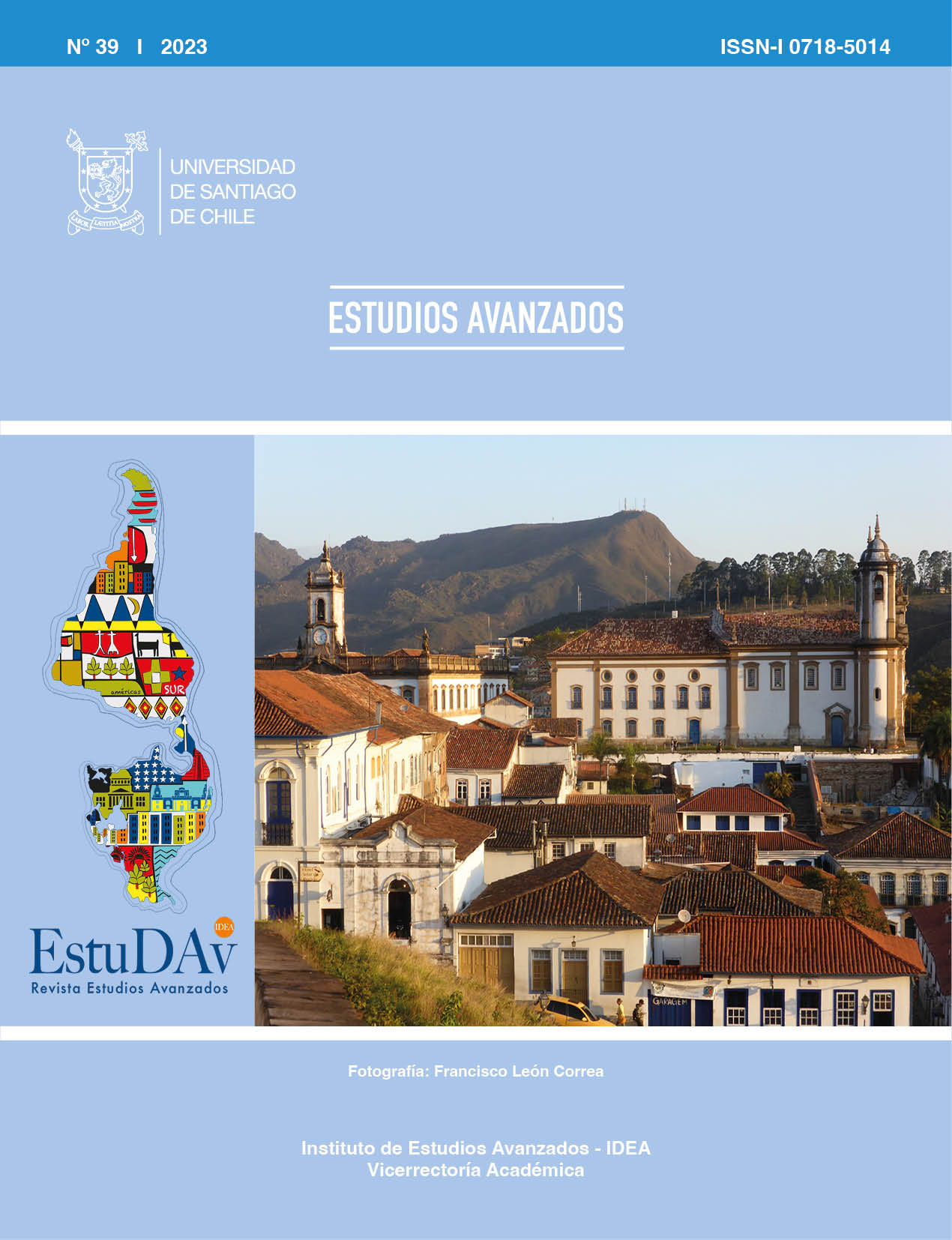Material Forces or Ideational forces? Conflicts and Tensions in the Understanding of Religion in International Studies
DOI:
https://doi.org/10.35588/estudav.v0i39.5743Keywords:
ideational fores, material forces, international studiesAbstract
The studies of foreign policy, economy, geopolitics, and war conflicts are central topics on the agenda of international studies, however, when studying them, we omit everything that seems far from the rational and quantitative, omitting to a great extent the reasoning that understands what is foreign to that. Aspects as powerful as those that circumscribe the religious phenomenon as the engine of international politics disappear in the analytical efforts of international scholars. In this article, we ask why thoughts, feelings, and ideas have been left aside as creative forces within international studies. Carrying out a bibliographical analysis, we can help to understand this omission, seeking at the same time to highlight the importance of this theme for a holistic understanding of the discipline.
Downloads
References
Allan, P. (2001). Ontologías y explicaciones en la teoría de las relaciones internacionales. Revista de Ciencia Política, 21(1), 77-106.
Bastian, J.P. (1994). Protestantismos y modernidad latinoamericana: Historia de unas minorías religiosas activas en América Latina. Fondo de Cultura Económica.
Bernal-Meza, R. (2016). Contemporary Latin American Thinking on International Relations: Theoretical, Conceptual and Methodological Contributions. Revista Brasileira de Política Internacional, 59(1), e005. https://doi.org/10.1590/0034-7329201600105
Calduch, R. (2003). MeÌtodos y teÌcnicas de investigacioÌn en Relaciones Internacionales. Madrid.
Carr, E. (2004). La crisis de los veinte años (1919-1939). Una introducción al estudio de las relaciones internacionales. La Catarata.
Casanova, J. (1994). Public Religions in the Modern World. University of Chicago Press.
Davie, G. (2007). Sociología de la religión. Akal.
Devés, E. (2009). La constitucioÌn de un pensamiento latinoamericano sobre asuntos internacionales. En Terceras Jornadas sobre PoliÌtica Exterior de Bolivia. OEA y UDABOL, La Paz y Santa Cruz de la Sierra, marzo de 2009. http://wold.fder.edu.uy/contenido/rrii/pensamiento-lat-asuntos-internacionales.pdf
Dougherty, J. y Pfaltzgraff, R. (2001). Contending Theories of International Relations. Longman.
Fediakova, E. (2013). Evangélicos, política y sociedad en Chile. Dejando «el refugio de las masas» 1990-2010. CEEP.
Garzón Vallejo, I. (2014). Postsecularidad: ¿Un nuevo paradigma de las ciencias sociales? Revista de Estudios Sociales, 1(50), 101-112. https://doi.org/10.7440/res50.2014.11
____. (2016). ¿De qué hablamos cuando hablamos del retorno de la religión? Revista Ideas y Valores, 65(162), 71-85. https://doi.org/10.15446/ideasyvalores.v65n162.47357
Habermas, J. (2005). Entre naturalismo y religión. Paidós.
Halliday, F. (1994). Rethinking International Relations. Macmillan.
Herzog, P. et al. (2020). Studying Religiosity and Spirituality: A Review of Macro, Micro, and Meso-Level Approaches. Religions, 11(9), 437. https://doi.org/10.3390/rel11090437
Hollis, M. y Smith, S. (1990). Explanining and Understanding International Relations. Oxford University Press.
Hurd, E. (2004). Political Authority of Secularism in International Relations. Europan Journal of International Relations, 10(2), 235-262. https://doi.org/10.1177/13540661040429
Inoue, C. y Tickner, A. (2016). Many Worlds, Many Theories? Revista Brasileira de Política Internacional, 59(2), e001. https://doi.org/10.1590/0034-7329201600201
Iranzo Dosdad, Á. (2006). Religión y Relaciones Internacionales. Genealogías. Foro Interno, 6, 39-65.
____. (2012). La religión: Un silencio de las R/relaciones I/internacionales: Causas de un exilio académico y desafíos teóricos de un «retorno» forzado. Colombia Internacional, 76, 15-50. http://dx.doi.org/10.7440/colombiaint76.2012.02
____. (2013). La comprensión del fenómeno religioso y sus desafíos a las Ciencias Sociales. Revista de Estudios Sociales, 47, 183-190. https://doi.org/10.7440/res47.2013.15
Kessler, O. (2009). Toward a Sociology of the International? International Relations between Anarchy and World Society. International Political Sociology, 3(1), 87-109. https://doi.org/10.1111/j.1749-5687.2008.00065.x
Lamont, C. (2015). Research Methods in International Relations. SAGE.
Ortiz, E. (2000). El estudio de las Relaciones Internacionales. Fondo de Cultura Económica.
Panotto, N. (2020). Incidencia religiosa en clave multilateral: La presencia de redes políticas evangélicas en las asambleas de la OEA. Revista Cultura y religión, 14(1), 100-120. http://dx.doi.org/10.4067/s0718-47272020000100100
Parker, C. (1996). Otra lógica en América Latina: Religión popular y modernización capitalista. Fondo de Cultura Económica.
Pereira, J.C. (2001). Historia de las Relaciones Internacionales contemporáneas. Ariel.
Pew Research Center (2014). Religion in Latin America: Widespread Change in a Historically Catholic Region. Pew Research Center.
Philpott, D. (2000). The Religous Roots of Modern International Relations. Wolrd Politics, 52(2), 206-245.
____. (2002). The Challenge of September 11 to Secularism in International Relations. World Politics, 55(1), 66-95. http://dx.doi.org/10.1353/wp.2003.0006
Renouvin, P. y Duroselle, J.B. (2000). Introducción a la historia de las relaciones internacionales. Fondo de Cultura Económica.
Salomón, M. (2002). La teoría de las Relaciones Internacionales en los albores del siglo XXI: Diálogo, disidencia, aproximaciones. Revista Electrónica de Estudios Internacionales (REEI), 4, 1-59.
Schenoni, L. y Escudé, C. (2016). Peripheral Realism Revisited. Revista Brasileira de Política Internacional, 59(1), e002. https://doi.org/10.1590/0034-7329201600102
Smith, S. (1997). Epistemology, Postmodernism and International Relations Theory: A Reply to Østerud. Journal of Peace Research, 34(3), 330-336. https://doi.org/10.1177/0022343397034003009
Snyder, J. (2011). Religion and International Relations Theory. Columbia University Press.
Stoll, D. (1990). Is Latin America Turning Protestan? The Politics of Evangelical Growth. University of California Press.
Taylor, C. (2014). Dilemmas and Connections. Select Essays. Harvard University Press.
Thomas, S. (2001). Faith, History and Martin Wight: The Role of Religion in the Historical Sociology of the English School of International Relations. International Affairs, 77(4), 905-929. https://doi.org/10.1111/1468-2346.00225
____. (2010). A Globalized God: Religions Growing Influence in International Politics. Foreing Affairs, 89(6), 93-101.
Waltz, K. (1988). Teoría de la política internacional. Grupo Editor Latinoamericano.
Wendt, A. (1999). Social Theory of Internacional Politics. Cambridge University Press.



